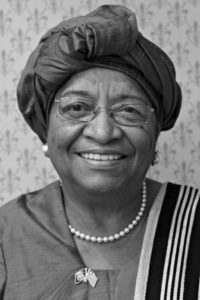
Ellen Johnson Sirleaf
Born in Monrovia, Liberia in 1938, Ellen Johnson Sirleaf studied economics at Harvard University. After her return to Liberia, she served as Assistant Minister of Finance under President William Tolbert and as Minister of Finance in Samuel K. Doe’s military dictatorship. She became known for her personal financial integrity and differed with both heads of state. During Doe’s regime she was imprisoned twice and narrowly avoided execution.
In 1985, as a candidate for a seat in the Senate, she openly criticized the military government. This led to her arrest and a 10-year prison sentence. She was, however, released after a short time and allowed to leave the country. Liberia descended into a civil war.
During 12 years of exile in Kenya and the US, Ellen worked as an economist for the World Bank, Citibank, and other international financial institutions. From 1992 to 1997 she was the director of the Regional Bureau for Africa of the United Nations Development Programme.
When a tentative truce was declared in Liberia in 1997, Ellen stood for election as President, as a candidate of the Unity Party. She was defeated by Charles Taylor and was forced back into exile when his government charged her with treason. By 1999 Liberia’s civil war had resumed.
In 2003, Charles Taylor himself went into exile. Ellen returned to Liberia to chair the Commission on Good Governance, which oversaw preparations for democratic elections. In 2005, she won the presidential election, defeating football legend George Weah. She became the first woman to lead an African nation.
She promised to end the civil war and corruption and rebuild the country, But it was a daunting task with more than 15,000 UN peacekeepers in the country and 80% unemployment rate. She sought debt amelioration and international aid and, by late 2010, she had erased Liberia’s entire debt and secured millions of dollars of foreign investment. She took steps to prevent unsustainable borrowing in the future by restricting annual borrowing to 3% of GDP and limiting expenditure of all borrowed funds to one-off infrastructure projects. She had also set up the Anti-Corruption Commission in 2008.
Ellen Johnson made education free and compulsory for all elementary school aged children. She also passed a Freedom of Information Act, the first legislation of its kind in West Africa. Further, she strengthened Liberia’s relations with many foreign countries including the US and China.
Ellen Johnson had established a Truth and Reconciliation Committee (TRC) in 2006 to probe corruption and heal ethnic tensions. Unfortunately, one of the TRC’s reports recommended that she, along with a number of others, be banned from holding elective office for 30 years for having supported warring factions in the civil war. It was a fact that she had supported Charles Taylor for a time very early in the war. On 26 July 2009, Ellen Johnson apologized to Liberia for supporting Charles Taylor, saying: “When the true nature of Mr. Taylor’s intentions became known, there was no more impassioned critic or strong opponent to him in a democratic process than me.” In spite of the TRC recommendation (which was not binding), she received widespread domestic and international support.
Though Ellen Johnson had promised to leave the presidency after one term, she decided to stand for reelection in 2011, stating that she still had work to do. She received the maximum votes, but it was less than 50%. William Tubman, her opponent in the runoff election dropped out, alleging voting irregularities in the first round. Though Ellen Johnson was reelected with 90% votes, her victory was clouded by Tubman’s withdrawal and low voter turnout.
Ellen Johnson’s second term was marked by the epidemic of the Ebola virus. It killed more than 4800 people, devastated the country’s economy, and erased many of the gains made during her first term. Ellen Johnson’s second term ended in January 2018.
Ellen Johnson’s regime was not without controversies. Apart from her decision to run for a second term, she was also criticized for letting some of her children hold high-level jobs in government or state-owned enterprises. They have also been accused of criminal activities. Yet, there has been a recognition of her strong leadership of Liberia during the challenging period of transition after the country’s devastating civil war and for the positive changes that took place in Liberia under her administration. She has been repeatedly named as one of the best leaders in Africa.
She has received many awards and honours including:
- Ralph Bunche International Leadership Award
- 2006 Laureate of the Africa Prize for Leadership for the Sustainable End of Hunger Project
- 2007 Presidential Medal of Freedom, the highest civilian award given by the United States
- 2008 Golden Plate Award of the American Academy of Achievement
- 2011 African Gender Award
- 2011 Nobel Peace Prize
- 2012 Indira Gandhi Prize for Peace, Disarmament and Development
- 2018 Ibrahim Prize for Achievement in African Leadership.
Ellen Johnson remains active even after leaving Liberian politics. In 2019, she was appointed as the WHO Goodwill Ambassador for the health workforce. Amid the COVID-19 pandemic in 2020, she stepped down from this post to serve as co-chair (alongside Helen Clark) of the WHO’s Independent Panel for Pandemic Preparedness and Response.
Afterword: In 2010, Ellen Johnson released her memoir: This Child Will Be Great: Memoir of a Remarkable Life by Africa’s First Woman President.
